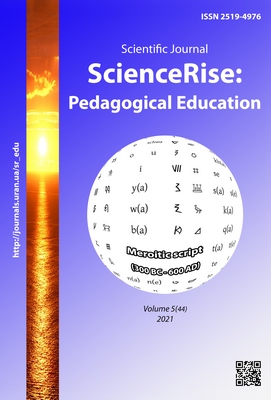Global imperatives of economic component development of general secondary education in Ukraine
DOI:
https://doi.org/10.15587/2519-4984.2021.241186Keywords:
international financial cooperation of countries, international program , Summary ESCAbstract
A literary analysis of economic issues of financing education by the state, in accordance with international law and globalization of the world economy in order to implement the right to quality education is presented. A conceptual analysis of the system of improving the financing of educational institutions in Ukraine, in particular the specifics and various mechanisms for raising funds and international cooperation of developing countries with developed countries and international programs has been conducted. In addition, the results of international assistance to Ukraine, including financial assistance at the level of general education – international charitable assistance in the form of an international project "House of Europe", within the international programs "Erasmus +" and "European Solidarity Corps" are analyzed. The international program "House of Europe" is presented, which supports creative cooperation between Ukrainian organizations, educational institutions and their partners from the EU and the UK, finances the development of cultural infrastructure and educational programs for young people. Also presented is the Erasmus + Program (2021–2027), an EU program to support and develop education, training, youth and sport in Europe. The program focuses on the social integration of young people, the environmental and digital development of developing countries, and the participation of young people in democratic life.
According to the results of joint activities within the international program / project "House of Europe", the international program "Erasmus" and the European Solidarity Corps, the most defined criteria for the quality of general secondary education are identified, namely: objective assessments of educational institutions - student performance tests, the probability of successful entry into prestigious colleges and universities after graduating from primary and secondary school; as well as subjective assessments - attendance of classes, received assessments (success), students' interest in certain training courses / programs, taught in an educational institution.
Statistics on the activities of the "ESC Summary" / European Solidarity Corps and "Erasmus +" for 2019–2020 according to the reporting "ESC Summary" / European Solidarity Corps and "Erasmus +" are presented
References
- Pro osvitu (2017). Zakon Ukrainy No. 2145-VIII. 05.09.2017. Available at: https://zakon.rada.gov.ua/laws/show/2145-19#Text
- Pro povnu zahalnu seredniu osvitu (2020). Zakon Ukrainy No. 463-IX. 16.01.2020. Available at: https://zakon.rada.gov.ua/laws/show/463-20#Text
- Kontseptsiia novoi ukrainskoi shkoly. Available at: https://www.pedrada.com.ua/article/2372-ad-fontes-pro-kontseptsyu-novo-ukransko-shkoli
- Arkhirieiev, S. I. (Ed.) (2018). Global economy. Kharkiv: Vydavnytstvo Ivanchenka I. S., 192. Available at: http://dspace.ksau.kherson.ua/bitstream/handle/123456789/4647/%20%20%20%20%20%20%20%20%20%20%20%20%20%20%20%20%20%20%20.pdf?sequence=1
- Lukianenko, D. H., Poruchnyk, A. M., Kolot, A. M., Stoliarchuk, Ya. M. et. al.; Lukianenko, D. H., Poruchnyk, A. M. (Eds.) (2011). Resursy ta modeli hlobalnoho ekonomichnoho rozvytku. Kyiv: KNEU, 703. Available at: https://kneu.edu.ua/ua/science_kneu/scientific_schools/ustv/ustv_praci/ustv_prazi/rtmger/
- Amerykanski prohramy akademichnykh obminiv. Available at: https://www.donnu.edu.ua/uk/osvitni-mozhlivosti-yaki-nadaye-posolstvo-ssha-v-ukrayini/
- Ukraina pidnialasia na 17 pozytsii u reitynhu autsorsynhovoi pryvablyvosti, zainiavshy 24-te mistse (2016). Informatsiine ahenstvo UNIAN. Available at: https://www.unian.ua/science/1237760-ukrajina-pidnyalasya-na-17-pozitsiy-u-reytingu-autsorsingovoji-privablivosti-zaynyavshi-24-te-mistse.html
- Yevropeiskyi tsentralnyi bank rekonstruktsii ta rozvytku. Available at: https://uk.wikipedia.org/wiki/%D0%84%D0%B2%D1%80%D0%BE%D0%BF%D0%B5%D0%B9%D1%81%D1%8C%D0%BA%D0%B8%D0%B9_%D0%B1%D0%B0%D0%BD%D0%BA_%D1%80%D0%B5%D0%BA%D0%BE%D0%BD%D1%81%D1%82%D1%80%D1%83%D0%BA%D1%86%D1%96%D1%97_%D1%82%D0%B0_%D1%80%D0%BE%D0%B7%D0%B2%D0%B8%D1%82%D0%BA%D1%83
- Ukraina – Learning Nation. Available at: https://strategy.uifuture.org/ukraina-learning-nation.html
- Klymchuk, I. O. (2014). Teoriia i tekhnolohii realizatsii investytsiinykh mekhanizmiv u shkilnii osviti. Kyiv, 87. Available at: http://lib.iitta.gov.ua/707330/1/KLimchuk__posibnik_2014r_KLMISBN.pdf
- Mizhnarodna prohrama «House of Europe». Available at: https://npu.edu.ua/universytet/mizhnarodne-spivrobitnytstvo/mizhnarodni-hranty-ta-stypendii/house-of-europe-dim-yevropy
- Mizhnarodna prohrama «Erasmus+». Available at: https://ec.europa.eu/programmes/erasmus-plus/about_en
- Altbach, P. G., Knight, J. (2007). The Internationalization of Higher Education: Motivations and Realities. Journal of Studies in International Education, 11 (3-4), 290–305. doi: http://doi.org/10.1177/1028315307303542
- Amaral, A., Neave, G., Musselin, C., Maassen, P. (2009). European integration and the governance of higher education and research. Higher Education Dynamics, 6, 11. doi: http://doi.org/10.1007/978-1-4020-9505-4
- Elken, M., Gornitzka, A, Maassen, P., Vukasovic, M. (2011). European integration and the transformation of higher education. University of Oslo research paper, 57. Available at: https://www.academia.edu/17496953/European_integration_and_the_transformation_of_higher_education
- Janmaat, J. G. (2008). Nation-Building, Democratization and Internationalization as Competing Priorities in Ukraine’s Education System. Nationalities Papers, 36, 1–23. doi: http://doi.org/10.1080/00905990701848317
Downloads
Published
How to Cite
Issue
Section
License
Copyright (c) 2021 Iryna Klymchuk

This work is licensed under a Creative Commons Attribution 4.0 International License.
Our journal abides by the Creative Commons CC BY copyright rights and permissions for open access journals.
Authors, who are published in this journal, agree to the following conditions:
1. The authors reserve the right to authorship of the work and pass the first publication right of this work to the journal under the terms of a Creative Commons CC BY, which allows others to freely distribute the published research with the obligatory reference to the authors of the original work and the first publication of the work in this journal.
2. The authors have the right to conclude separate supplement agreements that relate to non-exclusive work distribution in the form in which it has been published by the journal (for example, to upload the work to the online storage of the journal or publish it as part of a monograph), provided that the reference to the first publication of the work in this journal is included.








